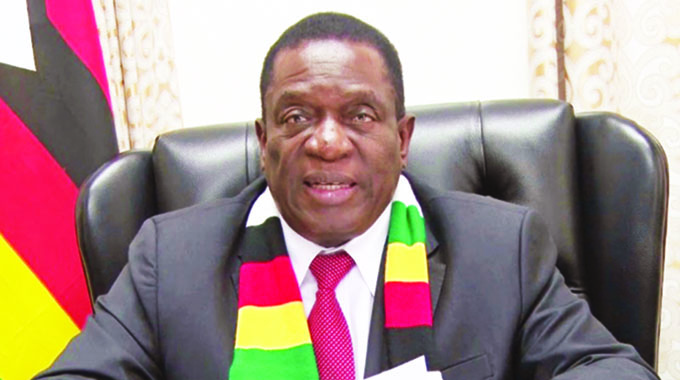Editorial Comment: Mentoring will help youths seize opportunities

For Zimbabwe to grow and for Zimbabweans to move out of poverty into at least middle income comfort, a lot of new businesses need to be established and a lot of Zimbabweans, especially younger Zimbabweans, need to think how they can become business people and employers rather than employees.
Obviously people need an opportunity to make start, and this is two-fold: education and skills on one hand and capital or credit on the other.
Of course there is a lot more, but that is up to those who grab the opportunity, to quote President Mnangagwa when he addressed this topic on Friday.
They have to work hard, very hard, and have to build their enterprise before they start tapping it for some rewards.
As the President noted, the Second Republic has been helping to create the conditions. Educations and skills training are being not just upgraded, but converted to a new emphasis on subjects and skills that can give school leavers and college-leavers a start, rather than expecting them to start all over again while their certificates are still drying in the sun and spending money and time on learning basic skills that they need to earn a living.
And schemes and programmes are being put in place. The huge switch in small-holder farming over the last couple of years, with a major acceleration from last season, is showing that just because someone has an activated land right in a communal land or a small A1 farm they are not doomed to be a subsistence farmer for the rest of their life.
Already a lot are now looking forward to commercial sales this year, and having money in their bank account or mobile money wallet, and are starting to think how they can expand next year. We are already seeing energetic youngsters going further with their farming, and finding out that it pays better than a minimum wage job.
And with reallocation of land that is not being used now imminent, with go-ahead youths among the first in line for allocations, we are starting to build that rural economy we need to support a lot more enterprises.
As President Mnangagwa noted, we are now also seeing efforts in the mining world, moving from environmentally-damaging gold panning and artisanal odd-job mining into something a bit more sustainable with proper rights and security.
But ever more people, and ever more youths, are going to have to move from the ultimate primary production, farming and mining, and start looking at other opportunities.
In effect they will be riding on the wealth created by primary production. We are now thinking about the small businesses that every community needs and needs down the road.
With the rising income in farming communities we suddenly start getting a requirement for businesses who can lay irrigation pipes, and fix the pipes.
We need people who can wire solar panels, who know how to clean them, and know how to position them to get maximum output. We need assorted handipeople and mechanics who can maintain and repair ever more complex machinery.
And this is besides the builders and carpenters and basic metal workers who are already in most communities.
But all of this requires besides the required level of skills some essential tools and while family profits from farming can help, many of these new businesses need extra help and this will require an expansion of the micro-finance and SME schemes that are being put in place and which are starting to work.
And somewhere along the line we need mentoring. Farmers are fortunate.
The Second Republic has been bringing Agritex up to full strength, and the veterinary services under the same ministry, and even if they cannot visit every day they provide the required basic business training, starting with keeping proper records, and can be tracked down nearby even if they are on someone else’s farm.
In urban areas, where the need to move away from ever more small shops or market stalls and start looking at selling skilled services is just as acute, mentoring is easier to find.
But in both rural and urban areas something more formal and organised is required, a bit more like what Agritex can offer farmers.
People talk airily about commercial courses, although a lot of these exam-orientated certificate factories do not provide a great deal of value for money and many of their graduates, hoping for a job with an established employer remain jobless.
What is needed is a basic introduction to business, something better than the blind leading the blind at a market, and then someone who can spend a couple of hours each month showing where new practical opportunities lie, checking progress and suggesting improvements.
Even knowing where to access funding, or what sort of licence is needed, is something that many need to know.
President Mnangagwa suggested established businesses could do more, and he mentioned the Affirmative Action Group as one possibility, but it probably needs a more inclusive effort.
There is learning in the small retail trade, where an over-high percentage of new businesses are concentrated, but not enough advice and help for the productive and service sectors.
And there are openings for other sorts of business, like being able to link skilled people with their customers.
Any one who doubts this should try and find a competent plumber on a Saturday afternoon when their tap has come off a standpipe.
There is obviously one nearby, and one who will come out with a toolbox, but how do the two of you link up?
The one point to note, as people move away from subsistence farming, illegal gold panning and total urban poverty is that the economy gets more complex, with more people doing more things and more specialised things.
There are many who can do all this, but who need advice and help on how to run a business, and that includes reinvesting rather than trying to lead the good life with spending every cent in revenue on consumer goodies, and how to market. After a while putting a notice on a tree is not the best way forward.
This is why the President’s suggestion for the more established to think a little about how they could help, even if just for a few hours a month is a good idea, and even something more formal through some sort of a programme that could co-ordinate such activity and even involve mentors such as retired people.










Comments